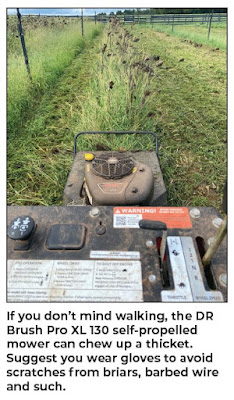Not once but twice, I
thought, “Oh, no. I’m about to die.”
I had been mowing on a slope when my tractor tipped at a
precarious angle. Once should have been warning enough. But on the second “oops,”
I drove the diesel machine straight to the farmhouse. This was in the days
before I toted a cell phone or used Google.
Once inside, I shuffled the stack of literature in the
corner of the kitchen counter. Picking up the DR Brush brochure, I dialed—on
the wall phone—the 1-800 number and placed an order for a walk-behind rotary
mower.
The powerful engine—with positive traction for the slopes—can chew up small saplings and waist-high grass without strain or tipping over. That meant that if I tripped and turned loose of the handle, the machine killed itself and not me. In a few days, a crate arrived at The Hartwell Sun’s warehouse.
That was
my first DR Brush. Now, I’m on a second mower with a more powerful 17.5-horsepower
engine. And if you put it in jack-rabbit gear, you best hop into your running
shoes. The bad boy will take you on a trot. When I feel frisky, I “get in my
steps” in high gear. On flat ground, of course.
Lately,
my mowing doesn’t end. With all the rain, I simply start over again. I believe that
if you stare at the grass for five minutes, you can see it inching skyward.
Sunday, my “ox was in the ditch,” chest-deep in grass and weeds. After church,
I spent time on the tractor and zero-turn mower.
Just
when I thought that I could embrace the balance of the “day of rest,” I
remembered the wilted sunflower patch. We plant sunflowers in stages, so that
the bright yellow blossoms are stretched out over three months. Friends and
strangers stop by to pick a few and take photos. It’s fun to witness and listen
to the oohs and aahs.
Sunday,
the second and third plantings were a drooping brown bunch. Next to them are
two rain-enhanced green patches racing—against the first frost—to show their
colors. My “ox” was still in the ditch.
And
since the dead patch was inside a board fence, I couldn’t get my tractor in
without driving over the almost-ready sunflowers. Poor planning on my part. Also,
I didn’t want to risk over-challenging my zero-turn mower on the thick
sunflower and invasive pigweed stalks.
Pigweed. Don’t get me started.
There
was only one thing to do—crank up my DR Brush.
If I had
been a Cool Hand Luke-type convict, with a sling blade, the task would have
taken an afternoon rather than just 30 minutes. All I had to do was shove the
DR Brush into first gear and trudge along, guiding it up and down the waist-to-shoulder-high
rows.
Chomp,
chomp, chomp.
By the
end of the second pass, Mother Nature opened her bird cage, and hundreds of
small birds, goldfinches and such, started picnicking on the sunflower seeds
being flung about. The machine was doing the work, giving me time to enjoy the
happy winged visitors.
Farms
are one of the most dangerous places to work. You can’t be too careful around
the equipment. I still get chill bumps thinking about the two times my tractor
almost turned over on me.
That’s why I consider my DR Brush a good investment in a “self-propelled life-
assurance policy.”
dnesmith@cninewspapers.com


